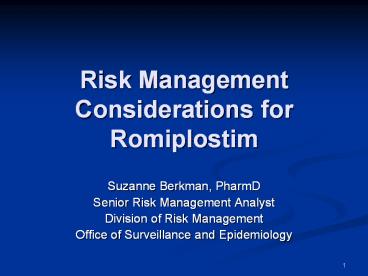Risk Management Considerations for Romiplostim - PowerPoint PPT Presentation
1 / 13
Title:
Risk Management Considerations for Romiplostim
Description:
How should insufficient response,' and intolerance' be defined? ... Should certain concomitant medication use be discouraged? Other considerations? 6 ... – PowerPoint PPT presentation
Number of Views:56
Avg rating:3.0/5.0
Title: Risk Management Considerations for Romiplostim
1
Risk Management Considerations for Romiplostim
- Suzanne Berkman, PharmD
- Senior Risk Management Analyst
- Division of Risk Management
- Office of Surveillance and Epidemiology
2
What is Risk Management?
- Risk assessment Risk minimization
- Routine risk management
- Labeling
- Spontaneous adverse event monitoring
- Additional measures
- Education and communication plans
- Distribution linked to safe use
- Risk assessment studies
3
Amgens Proposal
- Risk minimization
- Education and communication plan
- Medication Guide, training kit, pre-use checklist
- Controlled distribution
- Risk assessment
- Evaluation of program data
- Further studies
- No direct-to-consumer advertising
4
Further Considerations for Romiplostim
5
Possible Criteria for Appropriate Patient
Selection
- Should the duration of ITP be specified?
- Limit to splenectomized patients?
- How should insufficient response, and
intolerance be defined? - Should a particular platelet count be specified?
- Should a bone marrow biopsy be required?
- Should patients with a known history of bone
marrow stem cell disorder be considered? - Should patients with active malignancy be
considered? - Should certain concomitant medication use be
discouraged? - Other considerations?
6
Patient Monitoring
- What to monitor?
- How often to monitor?
- How to collect the data?
7
Risk Management Example Tysabri (natalizumab)
8
Tysabri (natalizumab)
- Indications
- Multiple Sclerosis (MS)
- Crohns disease
- Risk
- Progressive Multifocal Leukoencephalopathy (PML)
- Risk Management Program
- Tysabri Outreach Unified Commitment to Health
(TOUCH) Prescribing Program
9
TOUCH Prescribing Program
- Goals
- Minimize the risk and health consequences of PML
- Promote informed risk-benefit decisions
- Further assess the safety profile of natalizumab
- Reinforces
- Appropriate patient selection
- Risk communication
- Close patient monitoring and data collection
10
Prescriber/ Patient
TOUCH Prescribing Program
Infusion Site
- Assigns patient to authorized infusion site
- Changes patient status to authorized in TOUCH
online or provides Notice of Patient Authorization
Prescriber/ patient complete Enrollment Form
Infusion Site confirms patient is authorized to
receive natalizumab
Patient receives natalizumab infusion based on
answer to Pre-Infusion Checklist
6-month authorization periods begins and
Pre-Infusion Patient Checklists are tracked
monthly
Pre-Infusion Patient Checklist is submitted via
TOUCH online or faxed by Infusion Site
Prescriber completes Reauthorization Form every 6
months
Tracks all patients every 6 months
11
Differences to Consider
- Romiplostim
- Weekly subcutaneous injection
- Administered in prescribers office
- Specific laboratory monitoring?
- Multiple serious risks
- Preventable, manageable?
- Long term safety is a concern
- Off-label use within prescribers expertise
- Tysabri (natalizumab)
- Monthly infusion
- Administered in infusion center
- No specific laboratory monitoring
- One serious known risk
- Preventable, manageable?
- Long term safety is a concern
- Off-label use outside of neurology
12
Summary
- Mandatory enrollment of prescribers, patients,
other healthcare providers, and distributors - Clear criteria to identify the target patient
population - Mandatory education
- Mandatory regular monitoring
- Long-term data collection on all treated patients
13
- Return to Main































